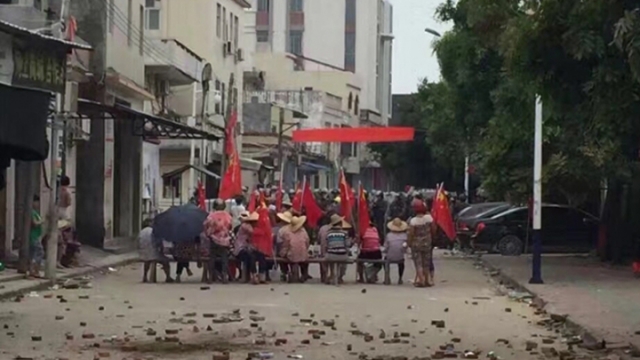Five journalists from Hong Kong outlets Ming Pao, the South China Morning Post, and HK01 were taken away and questioned on Wednesday night by police while they were at Wukan village, the site of violent clashes between police and villagers two days ago.
Wukan was seen as a “democracy experiment” after widespread protests in 2011, after which the village was allowed to elect its own leaders. Protests again erupted this year after village chief Lin Zuluan was detained by police under suspicion of taking bribes. Villagers held 85 days of demonstrations calling for his release and clashed with police on Tuesday after the arrest of 13 people from the village. A court in Foshan sentenced Lin Zuluan to three years and one month in jail last Thursday for taking bribes and accepting bribes as a non-state employee.

One of the reporters told RTHK that police broke into a villager’s home – where three of the journalists were hiding – at 9pm on Wednesday. They were ordered to crouch by police. The SCMP reporter was pinned to the floor, while the two Ming Pao reporters were hit once by police even though they were crouching.
Ming Pao’s reporter told the newspaper that the reporters were then lifted downstairs and thrown into a 7-seater car. They were taken to the Lufeng police station, where they were questioned about why they were in Wukan and how they contacted the villagers. The reporters were also told that their reporting activities were illegal.
Ming Pao said the reporters signed a statement stating that “they would not illegally come to report in Lufeng again.” However, the SCMP reporter was not asked to sign any documents, according to the English media outlet.
Two HK01 journalists were taken away as they were trying to reach a local hospital. HK01 told HKFP that their reporters were not hit by the police, but were similarly asked to sign the document.
The five reporters were detained for five hours before being put on a vehicle to Shenzhen, where they made their way back to Hong Kong.
According to a Reuters journalist, correspondents from the news agency were also detained, but have since been released.
Journalists reporting on #Wukan #乌坎 detained in police sting, Reuters correspondents also detained (now released) https://t.co/E6v9Z2sPUI
— Natalie Thomas (@NatalieReuters) September 15, 2016
Journalists were not permitted to enter the village on Wednesday. The police asked reporters to leave the area, saying that “a dangerous typhoon was coming,” according to Stephen McDonell of the BBC.
According to Ming Pao, the police were offering villagers RMB20,000 (HK$23,250) for “providing clues about foreign forces.”
police offering 20,000 yuan per foreign journalist in Wukan, as per Ming Pao h/t @pingroma
because you’re worth it pic.twitter.com/WQ3TEMN2tz
— isabella steger (@stegersaurus) September 15, 2016
‘Foreign forces’
Mainland media criticised Hong Kong and foreign journalists reporting in the village after Lin Zuluan’s arrest in June, when it said that “we welcome foreign media to conduct interviews and report objectively according to laws and regulations, but foreign media outlets like Apple Daily and Initium Media are inciting, planning, and directing. We will take measures according to the law.”
The Global Times published an article on Thursday saying that “some foreign forces… don’t want this ‘fight for human rights’ to end that easily. So they exaggerated everything they heard and even faked the grandmother’s death.” Chinese media in Hong Kong reported rumours that an elderly woman may have died in the conflict on Tuesday, which were later refuted by mainland media.

The Hong Kong Journalists Association said that it “strongly condemns Chinese public security officers’ violent treatment against Hong Kong journalists” reporting in Wukan. It also called for the Hong Kong government to “look into the matter and take effective measures” to protect Hong Kong journalists in the mainland.
Hong Kong’s Democratic Party is also holding a protest at the Central Government Offices over the reporters’ detention. In a statement, it said that the party “supports Wukan villagers defending their rights, and demands that the Hong Kong government follow up on Hong Kong reporters who were arrested and hit while reporting.”
